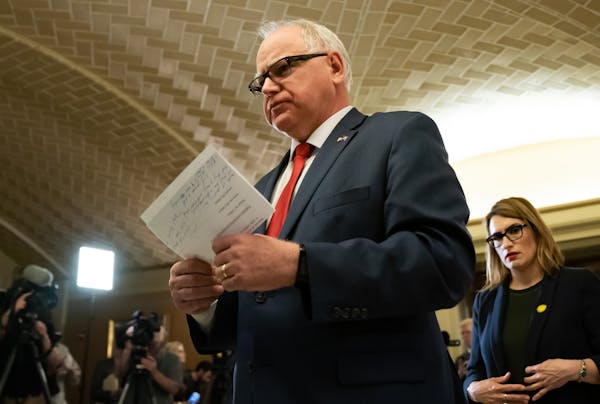Budget talks between Minnesota lawmakers stalled again Monday, as Democrats and Republicans remained sharply divided on taxes with just a week left in the legislative session.
Facing a May 20 adjournment deadline, the two sides are trying to land on an overall number for the next two-year state spending plan and specific figures for how much should be spent in key areas such as schools and health and human services.
Monday's breakdown came after hours of incremental progress as formal negotiations resumed in earnest for the first time in nearly a week.
Senate Republicans, who hold the majority in the upper chamber, and the DFL leaders controlling the governor's office and state House met several times throughout the afternoon, exchanging offers that inched the two sides toward a compromise on key spending areas.
But ultimately, disagreements on two issues that have divided and dogged lawmakers all session — whether to boost state gasoline taxes to pay for pay for road improvements and renew a 2% tax on medical providers that covers health care services — appeared to derail the talks.
Senate Majority Leader Paul Gazelka, R-Nisswa, held firm on his opposition to tax increases, suggesting that an additional $100 million in spending offered by the GOP to boost schools and public safety funding could come instead from the budget surplus and reserves. Late Monday, he emerged from a brief meeting with Democrats, armed with a poster showing budget figures and corresponding emojis. Smiley faces and thumbs-up went alongside budget reserves and higher-than-anticipated spring tax revenue. Next to the DFL-backed tax increases was a wide-eyed, red-cheeked face showing surprise and disbelief.
"We're simply saying we have resources … let's live within the resources that we have," Gazelka said.
The move incensed Democrats, who argue that additional revenue is needed to properly pay for crucial state services. Walz and DFL leaders blasted the Republican response as irresponsible and unserious in light of their own offer to cut spending and drop their proposed gas tax hike from 20 to 16 cents per gallon.
"I won't hide that I'm disappointed. I truly thought we were making progress," Walz said. "Instead of giving a measured response we got a radical departure from what we've been seeing."
Democrats also say the state must continue the health care provider tax, which generates $700 million annually but is set to sunset at the end of the year.
"We are not going to cut health care for elderly Minnesotans. We are not going to cut health care for disabled people in Minnesota," said House Speaker Melissa Hortman, D-Brooklyn Park.
But Gazelka said extending that tax remains "off the table" given an approximately $1 billion budget surplus and about $2.5 billion in reserves Republicans want to begin to spend down. He also noted that, according to state budget officials, Minnesota netted about $500 million more than expected in April tax revenue.
"We've looked at some numbers on how we balance the budget," Gazelka responded. "And we can get to places of compromise that still do not need any tax increases to work."
Democrats, however, warned that the Republican approach of tapping reserves and balancing the budget for only two years at a time threatens to create instability and deficits for years to come.
Legislators said they need to come up with spending targets for the state budget by Wednesday at the latest to pass an agreement by Monday. Talks were expected to resume sometime Tuesday.
Stephen Montemayor contributed to this report.





